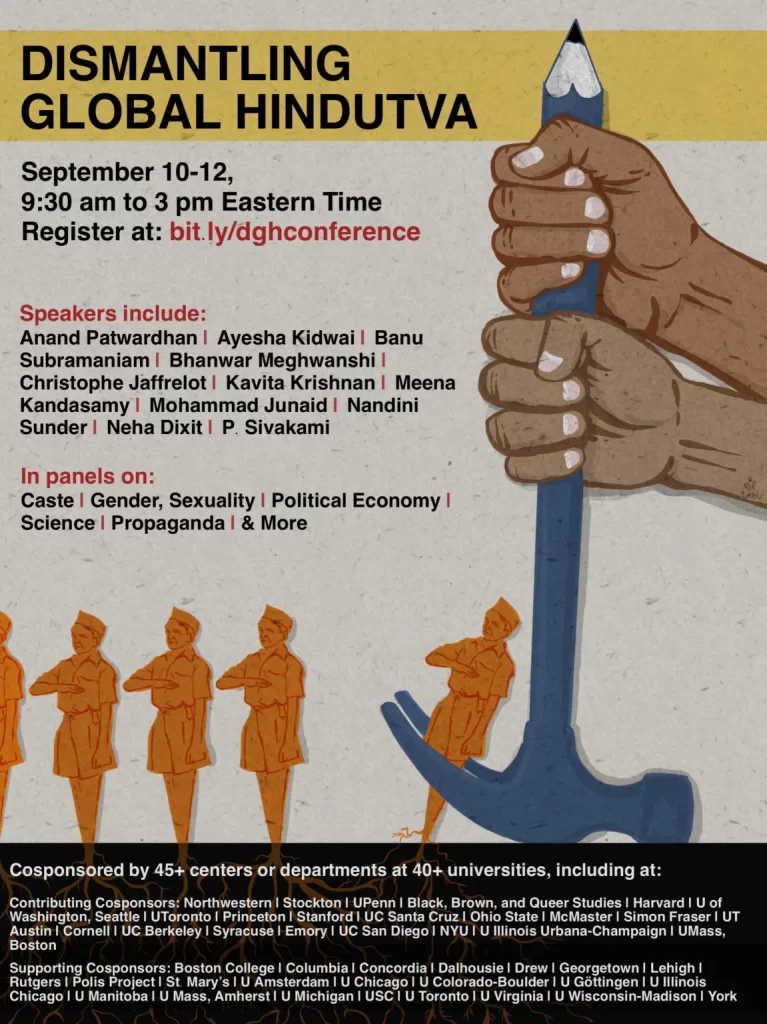In September 2021, a controversial event titled “Dismantling Global Hindutva” (DGH) took place, with the endorsement of several universities across the United States and globally. Marketed as an academic conference, the event claimed to critically analyze Hindutva, which it characterized as a “fascist ideology” promoting violence and marginalization of minority communities in India. The event sparked immediate backlash, particularly from the Hindu community, who perceived the conference as an anti-Hindu platform. Diaspora organizations like the Hindu Forum Canada and Hindu American Foundation led a campaign to raise awareness about the harmful nature of this event.
This article examines the purpose of the DGH conference, its broader significance, and the potential implications it holds for Hindus around the world.

What Is the Dismantling Global Hindutva Event?
The “Dismantling Global Hindutva” event was framed by its organizers as an academic forum that would explore the political ideology of Hindutva, which they describe as a violent, oppressive, and exclusionary force. The stated goal of the conference was to critically examine Hindutva’s historical development and its alleged role in perpetuating violence against religious minorities and marginalized communities in India.
Organizers sought to distinguish Hindutva from Hinduism, claiming that their critique was not an attack on the religion itself but rather a political movement. However, based on promotional materials and the past statements of the listed speakers, it quickly became clear that the conference was not merely a critique of Hindutva but an event that perpetuated a reductionist, harmful narrative about Hindus and Hinduism.
Purpose and Significance of the Event
The DGH event’s core purpose was to align Hindutva with far-right ideologies like fascism, drawing parallels between the rise of Hindu nationalism in India and global trends of authoritarianism. Organizers promoted the idea that Hindutva, as represented by the Bharatiya Janata Party (BJP) in India, is inherently violent and seeks to oppress minority groups.
While such discussions might seem like legitimate political discourse, the significance of this event goes beyond its critique of a political ideology. By positioning Hindutva as synonymous with fascism and by misrepresenting Hinduism itself, the event effectively delegitimized Hindu voices, contributions, and beliefs. The narrative of Hindutva as a “fascist ideology” was designed not to promote understanding or dialogue, but to foster suspicion and fear towards Hindus.
The Implications for Hindus Globally
One of the most dangerous implications of the DGH conference is the potential to perpetuate Hinduphobia under the guise of academic freedom. By platforming speakers who have a history of making inflammatory statements about Hindu traditions and beliefs, the event normalized harmful stereotypes. For example, conference speaker Kavita Krishnan, a member of the Communist Party of India (Marxist-Leninist), controversially linked a brutal killing of a Muslim woman by her brothers to the Hindu festival of Raksha Bandhan, framing it as emblematic of the holiday’s supposed values.
Other speakers, such as Neha Dixit, have previously used incidents like the COVID-19 crisis to falsely associate Hindu religious practices with negligence, reinforcing negative biases. Several panelists made derogatory and hyper-sexualized comments about revered Hindu deities, such as Lord Rama and Lord Hanuman, suggesting that Hinduism’s sacred texts are vehicles for oppressive social structures.
By allowing these harmful views to be aired under the protection of academic freedom, the DGH conference contributes to a growing sense of alienation among Hindu students and faculty members, who now face hostility on campuses where their religion is portrayed as inherently supremacist or violent.
Why Is This Event Problematic for Hindus?
The DGH event is problematic for Hindus on multiple levels:
Hinduphobia Masquerading as Academic Discourse: The conference’s portrayal of Hindutva as a fascist ideology extends into demonizing Hinduism itself. Organizers draw false equivalences between Hinduism and social ills like casteism, ignoring the rich diversity and philosophical depth of the religion. The event’s website promoted materials that dismissed Hinduphobia as a mere invention of right-wing Hindu groups, thereby denying the real discrimination and violence faced by Hindus in many parts of the world.
- Erasure of Hindu Experiences: While the event purports to examine Hindutva’s impact on marginalized groups, it completely erases the historical and contemporary persecution faced by Hindus. For instance, the conference makes no mention of atrocities committed against Hindus during the 1971 Bangladesh Liberation War or the ongoing religious persecution of Hindus in Afghanistan and Pakistan. This selective acknowledgment of violence serves to marginalize Hindu experiences, reinforcing a biased narrative where Hindus are only ever seen as oppressors, never as victims.
- Targeting Hindu Students and Faculty: The political and partisan nature of this event puts Hindu students and faculty at risk of being stigmatized. Many Hindu students already face challenges in combating anti-Hindu depictions on college campuses, and events like DGH further legitimize these misrepresentations. By labeling Hindutva and, by extension, Hindus as fascist or supremacist, the conference contributes to an environment where Hindu students may feel compelled to defend their beliefs against unjust accusations, thus stifling open dialogue.
- Endorsing Hate Through Silence: Many of the universities listed as sponsors of the event were initially unaware of their logos being used in association with DGH. When this was brought to their attention, some institutions requested the removal of their logos, yet others remained silent. This silence can be interpreted as tacit approval of the conference’s divisive and harmful rhetoric, adding legitimacy to Hinduphobic ideologies.
Hinduism
Hinduism is one of the world’s oldest religions, encompassing a diverse array of spiritual teachings, practices, and philosophies. Rooted in values such as non-violence (ahimsa), oneness of existence, devotion (bhakti), and selfless service (seva), Hinduism is a pluralistic and deeply philosophical faith. Its followers embrace various paths toward spiritual growth, and the religion promotes tolerance, respect for all beings, and a celebration of diversity in beliefs and practices. With over a billion adherents worldwide, Hinduism’s rich cultural and spiritual heritage continues to influence seekers from all backgrounds.
Hindutva
Hindutva, meaning “Hinduness,” is a political ideology that seeks to define Indian nationalism through the lens of Hindu culture and identity. Emerging in the early 20th century, Hindutva is primarily a socio-political movement that emphasizes the protection and promotion of Hindu values within the broader context of Indian society. While some view it as a necessary defense of cultural heritage, others criticize it for fostering exclusion and sectarianism. Hindutva is not a religious or spiritual doctrine, but rather a political stance aimed at uniting Hindus in the face of perceived threats to their identity.
Hindutva and Hinduism are often mistakenly conflated, but they represent distinct concepts. While Hinduism is a spiritual, pluralistic religion with ancient roots, Hindutva is a modern political ideology centered on cultural nationalism. Equating the two can be harmful, as it falsely portrays Hinduism as inherently political or oppressive, which distorts its true nature. This misrepresentation fuels Hinduphobia and leads to unjust scrutiny of Hindus, undermining the rich, diverse, and peaceful traditions of the religion. Understanding this distinction is crucial to ensuring fair and accurate discourse about both Hinduism and Hindutva.
Hindu Forum Canada’s Response: Advocating for the Hindu Community
When the event “Dismantling Global Hindutva” was announced, Hindu Forum Canada (HFC) took swift action to protect the interests of the Hindu community, both on campuses and beyond. Understanding the harmful implications of this conference, HFC launched a concerted effort to communicate with universities that were either sponsoring or listed as co-sponsors of the event. Through well-crafted letters, HFC provided detailed information about the dangerous and misleading narrative being promoted by the conference organizers, stressing how this event could incite animosity, promote discrimination, and create a hostile atmosphere for Hindu students, faculty, and the broader community.
Communicating the Dangers of the Event
In these communications, HFC highlighted how the conference was not merely a critique of a political ideology but rather a platform for spreading falsehoods and harmful propaganda about Hinduism itself. HFC underscored the potential risks this event posed to Hindu students on campuses, who could face increased hostility and discrimination due to the misleading narratives. The letters also pointed out that such events could damage the broader social fabric by fostering dissent, animosity, and a toxic environment of divisiveness on university campuses, harming the inclusivity that academic institutions should stand for.
Positive Responses and University Cooperation
Several universities, such as Concordia University and York University, responded positively to HFC’s concerns. Concordia, for instance, clarified that they had never agreed to co-sponsor the event and expressed solidarity with the Hindu community, standing in support of their concerns. York University followed a similar path, acknowledging the problematic aspects of the conference and distancing themselves from it. These responses were the result of HFC’s diligent efforts to communicate the dangerous misinformation being propagated by the DGH event.
Challenges and Resistance from Other Institutions
However, not all institutions were receptive to HFC’s concerns. The University of Toronto (UofT), a major sponsor of the event, resisted HFC’s outreach. In their response, UofT defended their support of the event, proudly reaffirming their sponsorship. Despite HFC’s continuous discussions and efforts to highlight the negative implications of the event, UofT remained adamant in its position.
HFC’s Continued Efforts: A Peace Rally on Radha Ashtami
In response to this resistance, HFC organized a peace rally on the University of Toronto campus to raise awareness and peacefully demonstrate against the DGH event. This rally, which took place on the auspicious day of Radha Ashtami, was not just a show of resistance but also a call for harmony and understanding. It served as a reminder that the Hindu community was committed to peacefully countering misinformation and standing up against Hinduphobia.
The “Dismantling Global Hindutva” conference was more than just an academic exploration of a political ideology. It served as a platform to normalize anti-Hindu biases under the guise of opposing fascism. The implications of such an event go beyond scholarly discussion, as they perpetuate harmful stereotypes, undermine Hindu voices, and contribute to a growing environment of hostility towards Hindus on university campuses and beyond.
In a world that claims to value diversity and pluralism, it is vital that the Hindu community is allowed to represent itself without being reduced to a monolithic, vilified group. Events like DGH only deepen divisions, reinforcing stereotypes that harm not only Hindus but the very foundations of respectful academic and social discourse..



